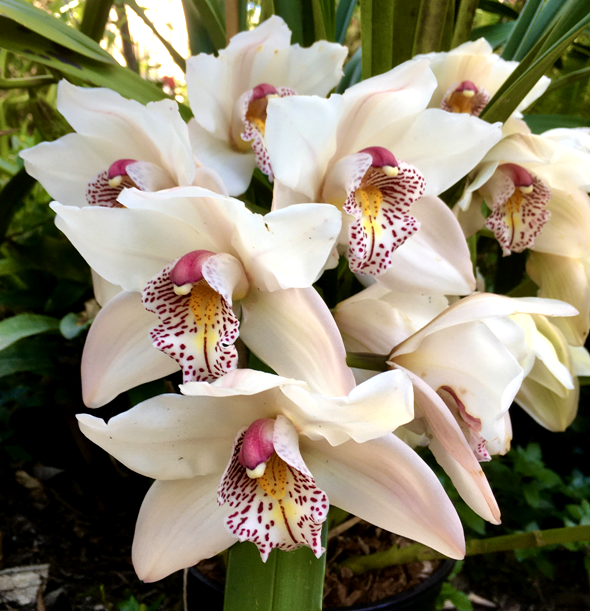
Preparations for the World Orchid Conference in Taiwan, interrupted by corona virus scare
February, 2020

Orchid Love in a Time of Corona Virus

© 2020 Norman Fang
What the modern traveler is wearing — Norman Fang on the way to Taiwan 
At this writing, our friend Norman Fang is in Taiwan. He traveled there a couple days ago to prepare for the World Orchid Conference. He reported about his travels on Facebook. The airports were nearly empty, there were many empty seats on the flight, which was therefore unusually comfortable. He is prepared with face masks and all the other supplies that the public can use to lessen the chance of picking up infections from their fellow travelers. About the time he arrived in Taipei, however, the conference organizers cancelled the event, or, as they said, postponed it. Preparations were already underway, and posters could still be seen advertising the show.
Norman knows the orchid business, he is well prepared to make the best of the situation. Who knows what deals the growers in Taiwan and elsewhere will be willing to make, given that their expected bonanza of orchid sales at the World Orchid Conference will not materialize? On the other hand, he may have to make some unusual arrangements when the time comes to return to California, if travel becomes even more restricted in an attempt to prevent the virus from spreading. In the meantime, we are following his posts intently.
What powers do these flowers have over us, that we are willing to travel halfway around the world for them, braving pestilence and plague? It is a remarkable phenomenon. We see the same thing on a small scale at every orchid club meeting. The orchid plants are always on the move: there is something about them, or about us, that makes us want to pick them up and carry them around. At the SCOS meetings, someone is always picking up an orchid plant and carrying it across the room. So often, in fact, that this has become a subject of mirth, reminding some of us over a certain age of a vaudeville skit we saw on the I Love Lucy show.

Cymbidium Woody Wilson 'White Knight', named after one of our past presidents. We saw it at Casa de las Orquideas, and it said "Pick me up and take me home!"
It is not only orchid nuts like ourselves who are affected by this instinct. In what is left of the tropical forests, the locals can't seem to help retrieving wild orchid plants and taking them home, whether for their own enjoyment or to sell at the village market. Perhaps even stranger, these plants are frequently tough enough that they can survive being plant-napped and held captive in someone's garden. Many were so tough that they survived being raided by Englishmen and shipped across the oceans in wooden crates, and then held captive in overheated "stove houses" (greenhouses heated with coal-burning stoves) on some dreary English estate, far from friends and family.
Wholesale forced migrations of orchids continued for a long time. The early newsletters of South Coast Orchid Society contain many notices about plant dealers based in Mexico, Peru, Guatemala, etc., who had just returned with a shipment of wild orchids, which they proposed to sell to collectors (such as our members).
From time to time, botanists have tried to illustrate the workings of evolution by turning the usual natural selection paradigm on its head. The plants, they say, are exploiting us, rather than the other way around. The plants that exhibit traits that humans find useful or appealing, such as big, sweet fruits, beautiful flowers (that is, flowers appealing to the hard-wired human sense of beauty), nutritious roots or seeds, etc., are able to induce us to propagate them and take them all over the world. The plants that have come up with the most attractive traits are now found on every continent except perhaps Antarctica: wheat, rice, roses, chiles, garlic, basil, olives, roses, potatoes, tomatoes, apples, broccoli, cabbage, mustard, geraniums, field mushrooms, poppies, and even orchids. Other plants, generally called weeds, made the same journey, but not for the same reason. Rather they relied on guile, sneaking their usually tiny seeds into shipments of grains or other human cargo: plants like dandelion, various grasses, chickweed, thistles, and all the others that we vainly attempt to eradicate from our gardens. Clever plants!
Events conspired to prevent Norman from presenting a lecture at the World Orchid Conference (and not only because of the virus, but that's another story). When he returns, we want to hear all about his adventures!